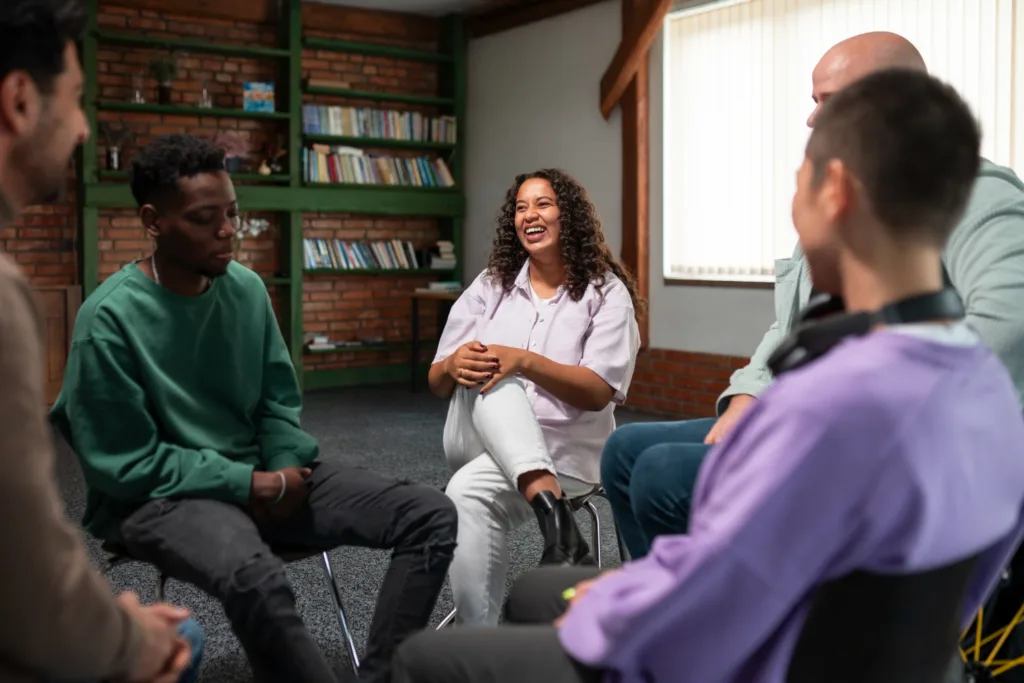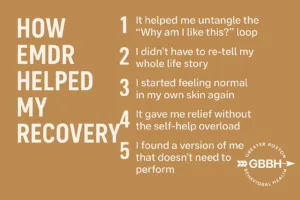Early sobriety is weird. No one tells you how lonely it can feel to do the right thing. You’re not drinking. You’re working on yourself. You’re healing. And somehow, that makes you feel even more out of place.
At least, that’s how it was for me.
People still invited me out, but I didn’t know what to do with my hands anymore. I couldn’t keep up with their jokes, didn’t feel funny without a drink, and always felt like I was half-present—watching everyone else vibe while I stood there, calculating my next water refill.
I didn’t think therapy could help with that. But then someone mentioned EMDR—and yeah, it sounded intense. Eye movements? Trauma reprocessing? I wasn’t even sure I had trauma.
But I gave it a shot. And what happened was… less dramatic than I expected—but way more powerful. EMDR didn’t just help me stop drinking. It helped me stop feeling like sobriety made me broken.
Here are five ways it helped shift how I saw myself—and made me feel like I belonged again.
1. It Helped Me Untangle the “Why Am I Like This?” Loop
Let’s be honest: a lot of us start drinking to feel normal. More social. Less awkward. Less… us. And when that’s gone, you’re left with the original discomfort, but without the buffer.
In EMDR, I didn’t just talk about drinking—I went deeper. We worked with memories that had nothing to do with alcohol on the surface, but everything to do with why I felt so out of place sober.
Like the time in middle school when someone said I was “too intense.” Or the look my dad gave me when I cried during a movie. Or the moment I decided being quiet was safer than being real.
Those moments don’t sound like trauma—but they stuck. And EMDR helped me unstick them.
It was like finding the roots of the beliefs I didn’t even realize were growing inside me:
- “I’m only fun when I’m altered.”
- “I ruin the mood when I’m real.”
- “People only like the filtered version of me.”
Working through those with EMDR felt less like “fixing” myself—and more like meeting myself for the first time.
2. I Didn’t Have to Re-Tell My Whole Life Story
I was so scared to start therapy because I didn’t want to drag up every cringey thing I’d ever done. I thought I’d have to talk about my worst nights in detail, or relive every screw-up. But EMDR doesn’t work like that.
When I started EMDR in Boston, MA, my therapist told me something that stuck:
“You don’t need to tell the whole story to heal from it.”
In EMDR, you focus on a feeling or a memory, and the therapist guides your brain to process it. You don’t have to describe it all out loud. You don’t even need to have words for it. It’s like your brain gets to finish what it couldn’t at the time—when you froze, shut down, or moved on too fast.
That was everything for me. I didn’t want to become the narrator of my pain. I just wanted to feel different. And EMDR helped me get there without dragging me through the mud.
3. I Started Feeling Normal in My Own Skin Again
This part is hard to explain unless you’ve been there.
When I was drinking, I felt relaxed. Smooth. Charming, even. After I got sober? I felt like a kid wearing adult clothes—stiff, out of place, hyper-aware of everything.
It wasn’t just social stuff. Even sitting on the train or standing in line made me feel awkward in my body. My shoulders stayed tight. My jaw clenched all the time. I was sober, but I didn’t feel safe.
EMDR helped that shift. Slowly, over a few sessions, I noticed:
- I stopped apologizing with my body.
- I wasn’t flinching at normal interactions.
- I could walk into a room without needing an escape plan.
My body stopped bracing for rejection. It started trusting that I was okay.
That didn’t mean I suddenly loved parties—but I could show up and be there without spiraling or shrinking.
4. It Gave Me Relief Without the Self-Help Overload
Before EMDR, I was burning out on tools.
Journaling. Meditating. Reading trauma books. Listening to three podcasts a week. I was doing everything “right,” but I still felt off. Like I was managing my mental health like a side hustle—and still not getting results.
What EMDR did was take that pressure off.
It wasn’t about doing more. It was about helping my brain process the backlog so I didn’t need to work so hard just to stay level.
After a few rounds of EMDR, I didn’t need a full routine just to make it through brunch. I could just… exist.
No toolbox. No panic. Just me. Which felt like a miracle.
5. I Found a Version of Me That Doesn’t Need to Perform
This was the big one.
Sobriety stripped away my armor. No more fake confidence. No more liquid charisma. Just me—raw, unsure, quiet. I felt like I lost the version of myself people actually liked.
But what EMDR gave me back wasn’t that old mask—it was something better. It was the version of me who didn’t need to be “on” to be enough.
Now, I show up to hangouts as the chill one. The one who listens, laughs, and leaves early without guilt. And I’m cool with that. Not everyone gets it—but the right people do.
EMDR helped me stop auditioning for friendship—and start belonging without a script.
Looking for EMDR in Needham, MA or Nearby?
If you’re reading this and feeling even a little seen, maybe that’s the sign.
You don’t have to be traumatized in the traditional sense to benefit from EMDR. Sometimes, it’s the tiny hurts—the invisible ones—that shape the way we shrink or overcompensate in rooms that feel loud.
At Greater Boston Behavioral Health, you’ll find a space that doesn’t pathologize your healing. Whether you’re looking for EMDR in Needham, MA or just want to talk to someone about why sober life feels like a social exile—you’ll be heard here. If you’re local to Newton, Dedham, or Wellesley, GBBH offers help that meets you exactly where you are.
FAQs About EMDR for the Sober and Socially Anxious
Is EMDR only for serious trauma?
Not at all. EMDR helps with any distressing memory or pattern your brain hasn’t fully processed. That could be a big event—or small, repeated moments that built up over time.
Will EMDR make me re-live painful memories?
You’ll revisit them, yes—but not in a way that floods or retraumatizes you. Your therapist will keep you grounded and safe. You don’t even have to describe everything out loud.
How long does EMDR take to work?
Some people feel lighter after just a few sessions. Others take more time, especially if they’re working through complex or layered issues. It’s not instant—but it’s real.
Can I do EMDR if I’m already in regular talk therapy?
Absolutely. Many people do both. EMDR can complement talk therapy by helping you process the stuff words can’t always reach.
What if I’ve never done therapy before?
That’s okay. EMDR is a solid place to start, especially if traditional talk therapy hasn’t felt helpful—or feels too overwhelming. You’ll be guided step-by-step.
Want help deciding if EMDR is right for you? Let’s talk.
Call (888) 450-3097 to learn more about our EMDR services in Boston, Massachusetts. You don’t have to carry this alone anymore.


